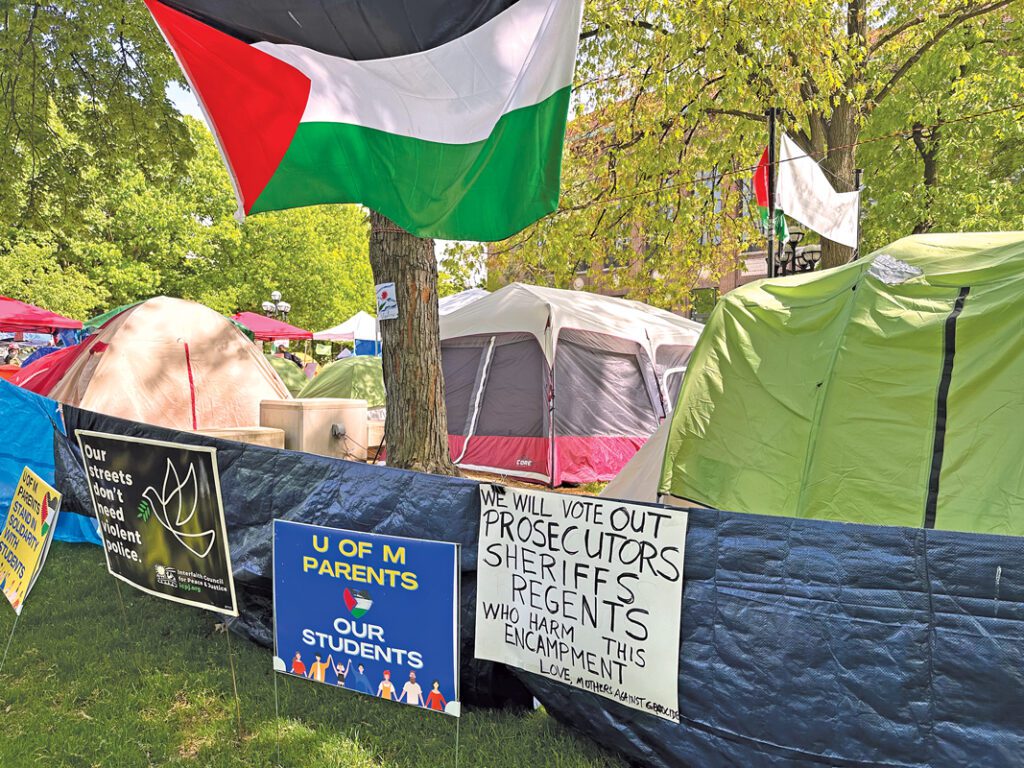
The Diag encampment was as entrenched as ever in May, as divestment protests expanded to the homes of two regents. Now the Shut It Down party wants to shift funding from student organizations to Palestinian groups. | Photo by Steve Friess
So says LSA rising senior Alifa Chowdhury, who in April became the first Muslim and hijabi woman elected to head U-M’s Central Student Government (CSG). “The majority of people elected us saying, ‘Yeah, go for it. Do this,’’’ she says. “This is what the majority of the student body wants.”
Less than 10 percent, actually—4,396 of the 48,848 eligible students voted for the Shut It Down Party ticket of Chowdhury and vice presidential candidate Eli Atkinson. But that was enough to beat a more traditional second-place ticket by 11 percentage points and win twenty-two of the forty-five seats in the CSG Assembly.
The assembly controls a budget of about $1.2 million that traditionally supports dozens of student organizations. Chowdhury and Atkinson, who spent nights at the encampment on the Diag in April and May, want to give it to Palestinian groups instead.
“The expectation is that it’s used for student org funding, but there’s no codified rule that that’s supposed to be the case,” says Atkinson, a rising junior. “So we were like, ‘Okay, well, if that’s not a rule, then why do we have to follow it? We can change it … If we get this money, we’re going to frame it as reparations and donate it, essentially.’”
All of this guarantees the impact of the war in Gaza will continue to reverberate on campus for the foreseeable future. A mid-May walk through the Diag found the protest encampment there as entrenched as ever, with posted daily schedules that included teach-ins, workshifts, and henna applications.
The divestment campaign also expanded off-campus in May with predawn visits to the homes of regent Sarah Hubbard in Okemos and Jordan Acker in Huntington Woods. Protestors taped lists of demands to both front doors, and left a doll crib and fake bloody corpses in Hubbard’s yard.
The Tahrir Coalition, a consortium of pro-divestment student groups, celebrated the incidents, prompting a rebuke from U-M. “The tactics used today represent a significant and dangerous escalation in the protests that have been occurring on campus,” the university wrote in a statement. “Going to an individual’s private residence is intimidating behavior and, in this instance, illegal trespassing.”
Some encampments elsewhere, among them UC–“Irvine and Columbia University, have been shut down by police. Others, including Northwestern and Harvard, ended with deals negotiated with administrators. But the regents voted in March not to divest and reiterated that stance in May. Hubbard, the board chair, tells the Observer there will be no negotiations.
Meanwhile, the organizations that rely on CSG are worried. Ryan Grover, president of the men’s rugby club, says his team sport gets about a quarter of its budget from the student government. “Outside of donations and player dues, it’s the largest source of income for us,” Grover emails. “We get almost nothing from the university and are deeply disappointed that such a vital resource for our team may not exist anymore.”
Chowdhury is unperturbed. “We’ve definitely gotten a couple of emails being like, ‘Hey, how do we get this funding?’ and the answer is, ‘You probably won’t,’” she says. “The people who are complaining about not getting funding could have voted.”
Hubbard says she expects “student government to act in an honorable way and to continue to fund student groups appropriately as they have in the past.” If they don’t, however, the regents can distribute the money themselves—and will if necessary.